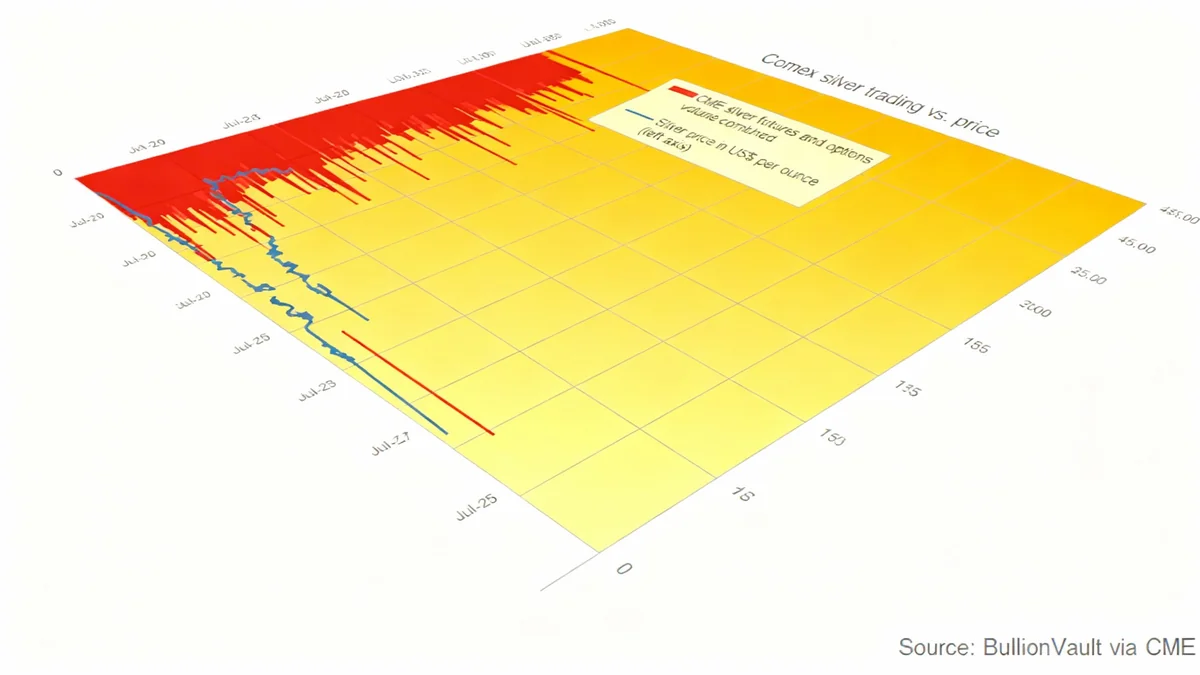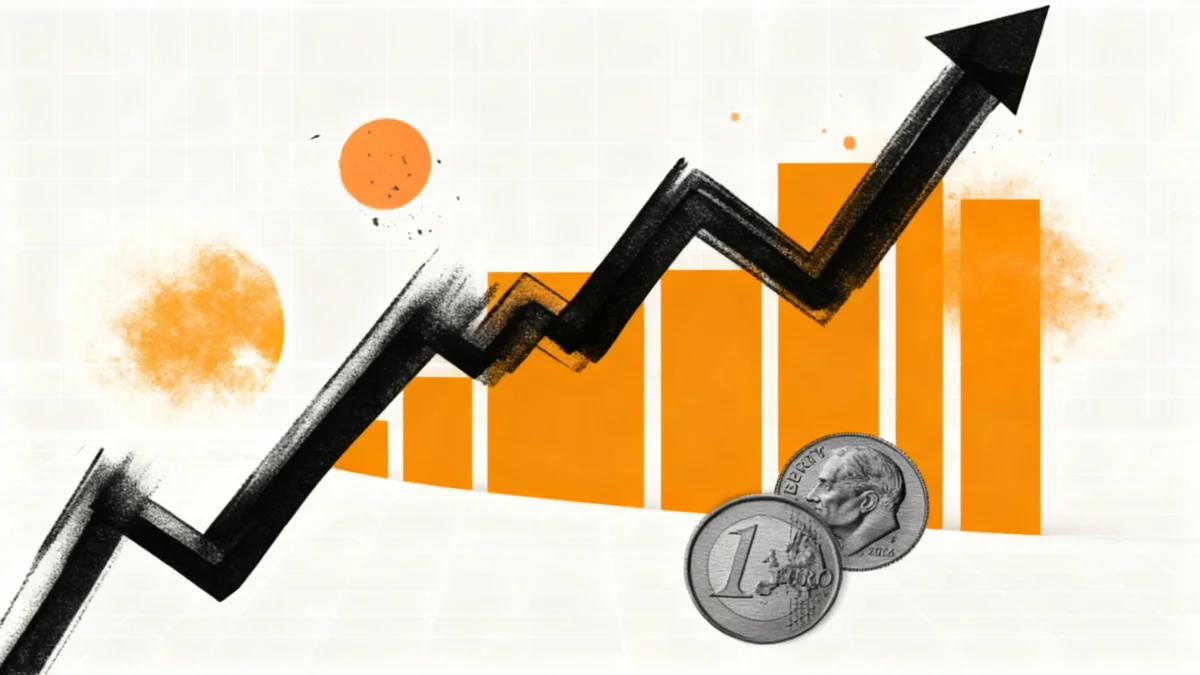U.S. stock futures showed minimal movement on Thursday morning, following a session where the S&P 500 and Nasdaq Composite closed at new record highs. Significant premarket activity was driven by corporate news, with Delta Air Lines shares rising on a strong earnings report and Akero Therapeutics surging after a multi-billion dollar acquisition announcement from Novo Nordisk.
The market is also processing recent minutes from the Federal Reserve, which indicate a willingness to continue cutting interest rates, though persistent inflation remains a key concern for policymakers. Meanwhile, the recent rally in gold prices has taken a pause after the precious metal surpassed the $4,000 mark earlier in the week.
Key Takeaways
- Stock futures for the Dow, S&P 500, and Nasdaq were nearly flat after the latter two indexes set new records.
- Delta Air Lines (DAL) stock jumped over 7% in premarket trading following a strong quarterly report and positive future guidance.
- Akero Therapeutics (AKRO) shares soared nearly 20% on news of a $5.2 billion acquisition deal by Novo Nordisk.
- Technology stocks, including Nvidia and AMD, continued to see investor interest amid the ongoing AI boom.
- Federal Reserve minutes reveal that officials are open to further rate cuts but are closely monitoring inflation data.
Market Overview: A Cautious Stance After Record Highs
Futures contracts tied to the major U.S. stock indexes were little changed in early trading. Futures for the Dow Jones Industrial Average, the S&P 500, and the tech-heavy Nasdaq 100 all hovered near the flatline. This stability comes after a mixed session on Wednesday, where the S&P 500 gained 0.6% and the Nasdaq Composite climbed 1.1% to close at all-time highs, while the Dow ended down by a single point.
The cautious sentiment reflects a market digesting recent gains and looking for new catalysts. Investors are weighing strong corporate performance in some sectors against broader economic uncertainties, particularly concerning inflation and future central bank policy.
Broader Market Indicators
Other key financial assets showed varied movements. Gold futures, which have seen a significant rally of approximately 54% this year, pulled back slightly by 0.3% to $4,060 an ounce. The yield on the 10-year Treasury note, a benchmark for borrowing costs, ticked up to 4.14%. In the cryptocurrency market, Bitcoin saw a modest increase, trading around $123,600. West Texas Intermediate crude oil futures also edged higher to $62.65 per barrel.
Corporate Movers: Delta and Akero Lead Premarket Gains
Several companies made significant moves in premarket trading based on specific news events, highlighting how individual corporate stories are influencing investor behavior.
Delta Air Lines Soars on Positive Forecast
Shares of Delta Air Lines (DAL) surged more than 7% before the opening bell. The airline reported record third-quarter revenue that exceeded analyst expectations. Furthermore, Delta provided a rosy outlook for the current fourth quarter, signaling continued strength in travel demand.
The positive results from a major carrier like Delta are often seen as a bellwether for consumer spending and the broader health of the travel and leisure industry.
Akero Therapeutics Jumps on Novo Nordisk Acquisition
In the pharmaceutical sector, Akero Therapeutics (AKRO) saw its shares pop nearly 20%. The surge followed an announcement from Danish drugmaker Novo Nordisk (NVO) that it would acquire Akero in a deal valued at up to $5.2 billion.
Novo Nordisk, known for its popular weight-loss drugs Ozempic and Wegovy, is acquiring Akero for its promising liver disease treatment, efruxifermin. Novo Nordisk CEO Mike Doustdar described the drug as a potential "cornerstone therapy" for metabolic dysfunction-associated steatohepatitis (MASH), a rapidly growing metabolic disease.
"If approved, we believe it could become a cornerstone therapy, alone or together with Wegovy (semaglutide), to tackle one of the fastest-growing metabolic diseases of our time," stated Novo Nordisk CEO Mike Doustdar.
The deal includes a cash payment of $4.7 billion, or $54 per share, with an additional potential payment of $500 million based on certain milestones.
Other Notable Stock Movements
Several other companies were also in focus during early trading:
- PepsiCo (PEP): The beverage and snack giant’s stock ticked higher after its third-quarter results beat estimates. The company also announced a change in its Chief Financial Officer, a move that comes as activist investor Elliott Investment Management pushes for changes.
- Advanced Micro Devices (AMD): Shares rose another 1%, building on a 43% gain from earlier in the week. The rally was sparked by news of a major partnership with OpenAI.
- Nvidia (NVDA): The chipmaker's stock was up an additional 2%. CEO Jensen Huang recently told CNBC that the "demand of computing has gone up substantially" in the last six months, fueling further investor optimism.
AI Investment Boom Faces Scrutiny
The massive gains in stocks like Nvidia and AMD have fueled a debate on Wall Street about a potential bubble in the artificial intelligence sector. Concerns have been raised over a series of complex, circular investment deals among chipmakers, cloud providers, and AI model developers.
Skeptics suggest these arrangements, where companies invest in their own customers, could be artificially inflating the demand for AI hardware. For example, Nvidia has invested in cloud companies that purchase its chips, leading some to question the organic strength of the market.
Wall Street Analyst Perspective
Despite these concerns, many analysts believe the AI boom is fundamentally sound. In recent notes, analysts at Bank of America and Goldman Sachs pushed back against the bubble narrative. Bank of America's Vivek Arya wrote, "We believe the recent concerns re AI financing are highly overstated," estimating that such deals would represent only a small fraction of the total AI spending expected by 2030.
Federal Reserve Navigates Economic Crossroads
Minutes released Wednesday from the Federal Open Market Committee's latest meeting provided insight into the central bank's thinking. The details confirmed that officials voted to cut the federal funds rate by a quarter of a percentage point last month, the first reduction this year.
The Fed faces a challenging dual mandate: maintaining price stability and ensuring maximum employment. Inflation continues to run above the central bank's 2% annual target, while recent data shows that job growth has slowed significantly.
The Dilemma of Rate Cuts
Policymakers are caught between cutting rates to stimulate the economy and create jobs, or holding rates higher to bring inflation under control. The federal funds rate is a crucial tool, as it influences borrowing costs for everything from mortgages to business loans.
While financial markets are currently pricing in the expectation of two more rate cuts this year, the Fed minutes suggest that this is not a guaranteed outcome. Officials emphasized their focus on inflation, indicating that any unexpected rise in prices could cause them to reconsider further rate reductions.
David Russell, global head of market strategy at TradeStation, noted the Fed's cautious stance. "Two more rate cuts aren’t a done deal because policymakers aren’t letting go of their inflation mandate," he wrote in a commentary following the release of the minutes.





